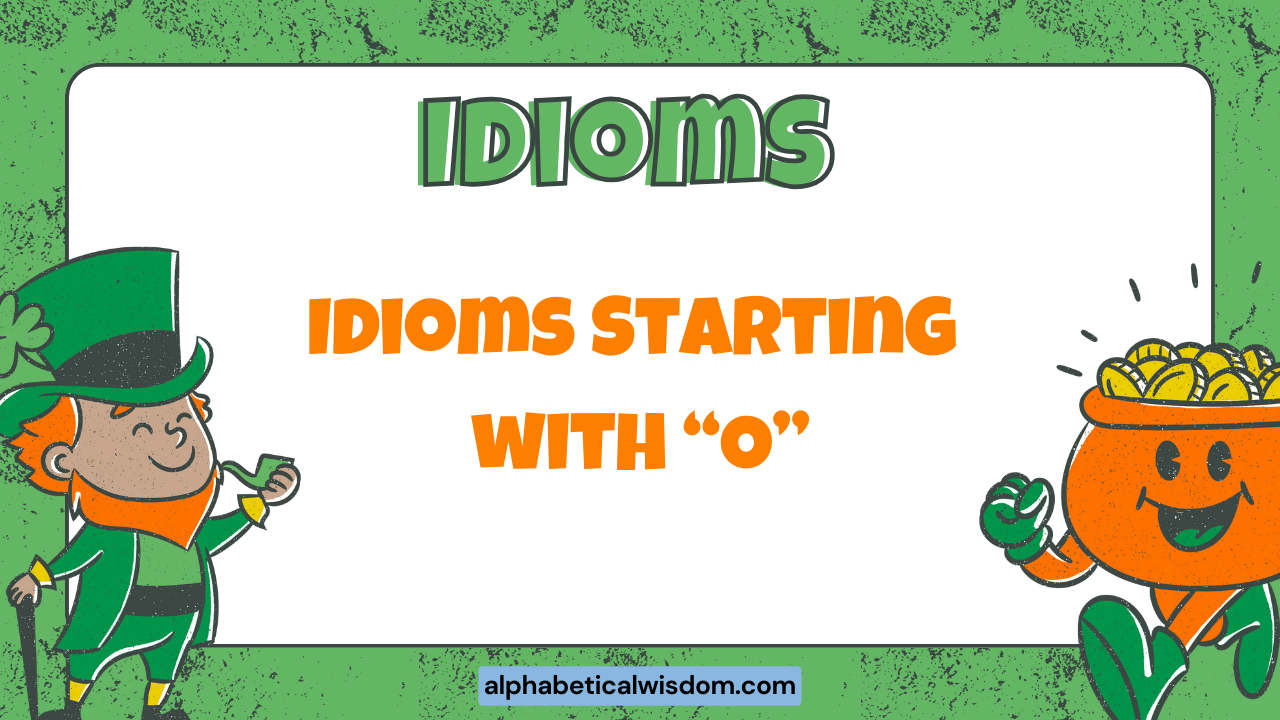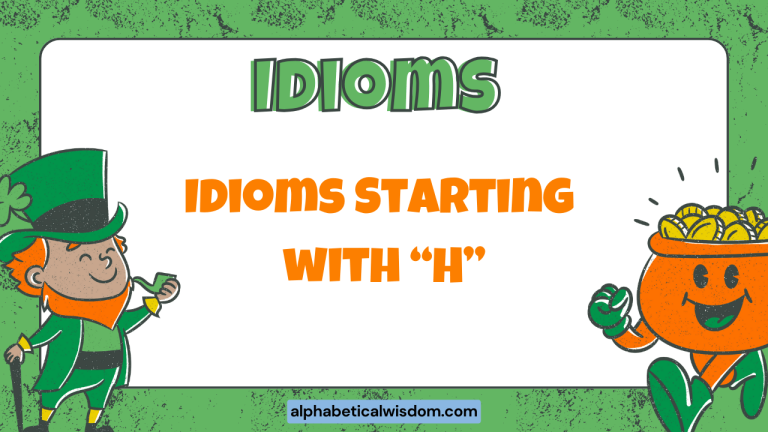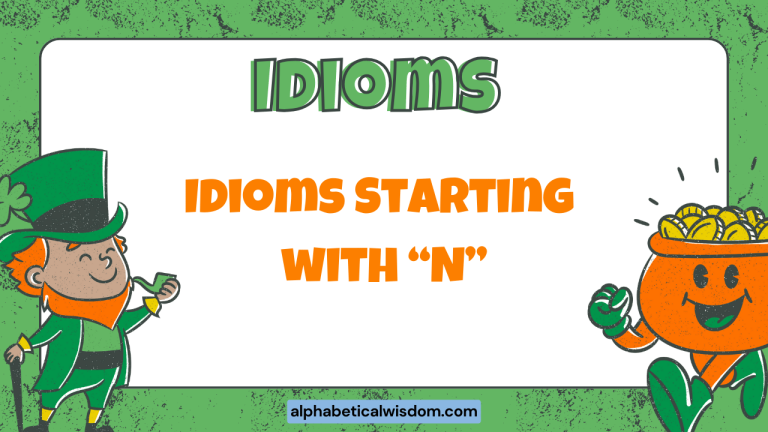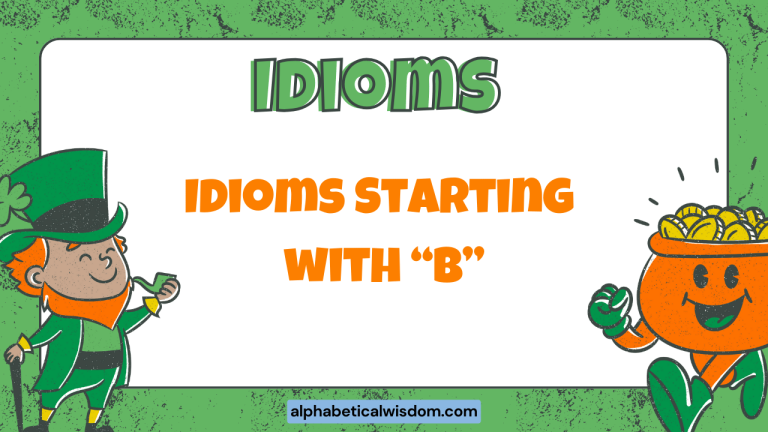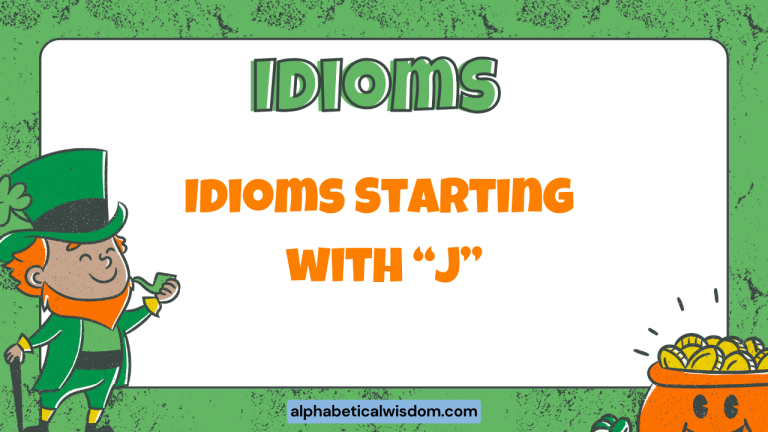Mastering English: A Comprehensive Guide to Idioms Starting with ‘O’
Idioms are a cornerstone of the English language, adding color, nuance, and depth to communication. Understanding idioms is essential for both native speakers and English language learners to grasp the full meaning of conversations, literature, and media.
This article focuses specifically on idioms that begin with the letter ‘O’, exploring their meanings, origins, and usage. By delving into these expressions, readers will enhance their comprehension skills, broaden their vocabulary, and gain a more profound appreciation for the richness of the English language.
This guide is designed for students, teachers, and anyone eager to improve their English proficiency and cultural understanding.
Table of Contents
- Introduction
- Definition of Idioms
- Structural Breakdown
- Types and Categories of Idioms
- Examples of Idioms Starting with ‘O’
- Usage Rules for Idioms
- Common Mistakes with Idioms
- Practice Exercises
- Advanced Topics
- Frequently Asked Questions
- Conclusion
Introduction
Idioms are phrases or expressions whose meanings cannot be understood from the literal meanings of the individual words. They are a vital part of colloquial English and are frequently used in everyday speech and writing.
Mastering idioms is crucial for achieving fluency and understanding native English speakers. This article will guide you through the fascinating world of idioms starting with the letter ‘O’, providing definitions, examples, and usage tips to help you confidently incorporate them into your vocabulary.
We will explore the nuances of these expressions, shedding light on their historical origins and cultural significance. By the end of this guide, you’ll be well-equipped to recognize, interpret, and use these idioms effectively, enhancing your overall communication skills.
Definition of Idioms
An idiom is a phrase or expression where the words used together have a meaning that is different from the dictionary definitions of the individual words. Idioms are often culturally specific and their meanings are learned through exposure and experience, rather than by deduction.
They add color and depth to language, making communication more expressive and engaging. Understanding idioms is essential for comprehending the intended message, especially in informal contexts.
Classification of Idioms
Idioms can be classified in several ways, including:
- Phrasal Verbs: Combinations of a verb and a preposition or adverb that create a new meaning (e.g., “own up”).
- Proverbial Idioms: Short, popular sayings that express a common truth or belief (e.g., “Out of sight, out of mind”).
- Clichés: Overused idioms that have lost their impact (e.g., “Once in a blue moon”).
- Euphemisms: Mild or indirect expressions used to replace harsh or offensive ones (e.g., “Passed on” instead of “died”).
Function of Idioms
Idioms serve several functions in language:
- Adding Color and Emphasis: They make language more vivid and interesting.
- Conveying Complex Ideas Simply: They can express nuanced concepts in a concise way.
- Establishing Rapport: Using idioms appropriately can show cultural understanding and build connections.
- Avoiding Directness: They can soften potentially offensive or awkward statements.
Contexts for Idiom Use
Idioms are commonly used in:
- Everyday Conversation: Informal discussions with friends, family, and colleagues.
- Literature: Novels, poems, and plays to add depth and authenticity.
- Media: News reports, television shows, and movies.
- Business Communication: Presentations, meetings, and emails (though often used with caution to ensure clarity).
Structural Breakdown
The structure of idioms can vary widely. Some idioms are short phrases, while others are complete sentences.
Understanding the grammatical structure of idioms can help language learners better understand and use them correctly. It’s important to remember that the grammatical structure of an idiom often differs from its literal interpretation.
Common Structural Patterns
Here are some common structural patterns found in idioms:
- Verb + Preposition: This is common in phrasal verbs (e.g., “Own up”).
- Noun + Verb + Preposition: (e.g., “A pain in the neck”).
- Adjective + Noun: (e.g., “Old hat”).
- Prepositional Phrase: (e.g., “On the ball”).
- Complete Sentence: Some idioms are full sentences that carry a figurative meaning (e.g., “Once bitten, twice shy”).
Variations and Flexibility
While idioms have a set meaning, some allow for slight variations in wording without changing the overall meaning. However, it’s crucial to be aware that not all variations are acceptable, and altering an idiom too much can render it meaningless or confusing.
Always double-check the correct form of an idiom before using it.
Types and Categories of Idioms
Idioms can be categorized based on their function, origin, or grammatical structure. Understanding these categories can provide a deeper insight into how idioms work and how they are used in different contexts.
Here, we’ll explore some of the most common categories of idioms.
Based on Origin
Idioms can be classified based on their historical or cultural origin:
- Literary Idioms: Derived from famous works of literature (e.g., “Catch-22” from Joseph Heller’s novel).
- Biblical Idioms: Originating from the Bible (e.g., “The writing is on the wall”).
- Historical Idioms: Rooted in historical events or practices (e.g., “Rub someone the wrong way”, possibly from grooming horses).
Based on Function
Idioms can also be categorized based on their communicative function:
- Descriptive Idioms: Used to describe a person, place, or thing (e.g., “An old flame”).
- Action Idioms: Describe an action or activity (e.g., “Oil the wheels”).
- Evaluative Idioms: Express an opinion or judgment (e.g., “Over the top”).
Based on Structure
As mentioned earlier, idioms can be classified based on their grammatical structure. This classification is useful for understanding how idioms fit into sentences and how they can be used correctly.
Examples of Idioms Starting with ‘O’
This section provides a comprehensive list of idioms that start with the letter ‘O’, complete with their meanings and example sentences. Understanding these idioms will significantly enhance your comprehension and communication skills.
Each idiom is explained in detail to ensure clarity and proper usage.
Table 1: Common Idioms Starting with ‘O’
The following table lists some of the most frequently used idioms that begin with the letter ‘O’. Each idiom is accompanied by its meaning and an example sentence to illustrate its usage.
| Idiom | Meaning | Example Sentence |
|---|---|---|
| Off the cuff | Without preparation or planning | He gave an off the cuff speech that impressed everyone. |
| Off the hook | Released from a responsibility or obligation | I was off the hook when my colleague offered to finish the report. |
| Off the record | Not for publication or public knowledge | The politician made some comments off the record during the interview. |
| Old hat | Outdated or no longer interesting | That style of clothing is old hat these days. |
| On cloud nine | Extremely happy or elated | She was on cloud nine after receiving the job offer. |
| On pins and needles | Anxious or nervous about something | I was on pins and needles waiting for the exam results. |
| On the ball | Alert, competent, and efficient | Our new project manager is really on the ball. |
| On the fence | Undecided or neutral | I’m still on the fence about which university to attend. |
| On the house | Free of charge, paid for by the establishment | The bartender gave us the drinks on the house. |
| On the mend | Recovering from an illness or injury | He’s on the mend after his surgery and should be back at work soon. |
| Once in a blue moon | Very rarely | I only go to the cinema once in a blue moon. |
| Open a can of worms | To create a complex and troublesome situation | Bringing up that issue would only open a can of worms. |
| Out of the blue | Unexpectedly or without warning | He called me out of the blue after many years of silence. |
| Out of this world | Extremely good or impressive | The food at that restaurant is out of this world. |
| Out on a limb | In a vulnerable or unsupported position | He went out on a limb to defend his colleague. |
| Over the moon | Extremely happy | She was over the moon when she found out she was pregnant. |
| Over the top | Exaggerated or excessive | His reaction to the news was a little over the top. |
| Old flame | A former lover | He ran into his old flame at the conference. |
| On second thought | After reconsidering | On second thought, I think I will have the soup instead of the salad. |
| On your toes | Alert and ready to react | The demanding boss always keeps his employees on their toes. |
| Off color | Slightly unwell | She was feeling a little off color yesterday, so she stayed home from work. |
| On the dot | Exactly on time | The meeting started at 9:00 AM on the dot. |
| On the up and up | Honest and legitimate | You can trust him; he’s on the up and up. |
Table 2: Less Common Idioms Starting with ‘O’
While the idioms in the previous table are widely used, the following idioms are less common but still valuable to know. Expanding your knowledge of less common idioms can make your language more nuanced and expressive.
| Idiom | Meaning | Example Sentence |
|---|---|---|
| Of course | Certainly; definitely | “Can you help me with this?” “Of course, I’d be glad to.” |
| Oil the wheels | To make something run more smoothly | A little gift can oil the wheels and help get the project approved. |
| Old wives’ tale | A superstition or traditional belief that is not based on fact | Don’t believe that old wives’ tale about cracking your knuckles causing arthritis. |
| On a shoestring | With very little money | They started their business on a shoestring and built it into a success. |
| On an even keel | Stable and balanced | After a rocky start, the project is now on an even keel. |
| On one’s last legs | Near the end of its life or usefulness | This old car is on its last legs; we need to buy a new one soon. |
| On the horizon | About to happen or appear | There are some exciting new opportunities on the horizon for our company. |
| On the level | Honest and truthful | You can trust what he says; he’s always on the level. |
| One-track mind | Thinking about only one particular thing | He has a one-track mind when it comes to football. |
| Open the floodgates | To release something that was previously held back | The new policy could open the floodgates to complaints. |
| Opportunity knocks | An opportunity is available | Opportunity knocks, and you have to be ready to seize it. |
| Order of magnitude | A large difference in quantity or size | The cost of the project was an order of magnitude greater than we expected. |
| Out for the count | Asleep or unconscious | After the long flight, he was out for the count. |
| Out of hand | Uncontrollable | The situation quickly got out of hand. |
| Out of line | Inappropriate or unacceptable | His comments were completely out of line. |
| Out of pocket | Having spent money | I’m a bit out of pocket after the vacation. |
| Out of sorts | Slightly unwell or unhappy | She’s been feeling a bit out of sorts lately. |
| Over and above | In addition to | He went over and above what was expected of him. |
| Over my dead body | Absolutely not; only if I am dead | “Are you going to sell the house?” “Over my dead body!” |
| Own up | To admit to having done something wrong | He finally owned up to breaking the vase. |
| Once bitten, twice shy | After a bad experience, one becomes more cautious | After the failed investment, he’s once bitten, twice shy about new ventures. |
| On easy street | In a state of financial comfort | After winning the lottery, they were finally on easy street. |
| Open season | A time when something is allowed or encouraged | After the announcement of the CEO’s departure, it was open season for internal promotions. |
Table 3: Idioms with ‘One’
Many idioms use the word “one” to refer to a person or an unspecified individual. These idioms often express general truths or experiences.
This table provides examples of such idioms and their meanings.
| Idiom | Meaning | Example Sentence |
|---|---|---|
| One in a million | Very special or rare | She’s one in a million; I’m lucky to have her as a friend. |
| One-off | Something done or made only once | The concert was a one-off event to raise money for charity. |
| One-sided | Unfair or biased | The argument was one-sided, with only one person getting to speak. |
| One step at a time | Gradually, not trying to do too much at once | Let’s take it one step at a time and see how it goes. |
| One’s bark is worse than one’s bite | Someone’s threats are worse than their actions | Don’t worry about him; his bark is worse than his bite. |
| One’s heart is in the right place | Someone has good intentions, even if they make mistakes | He may be clumsy, but his heart is in the right place. |
| One’s cup of tea | Something one enjoys or is interested in | Opera is not really my cup of tea. |
| One’s hands are tied | Unable to act because of rules or circumstances | I’d like to help, but my hands are tied. |
| One’s own medicine | To be treated the same way one treats others | He’s getting a taste of his own medicine now. |
| One’s Sunday best | The best clothes one owns, usually worn on special occasions | She was dressed in her Sunday best for the wedding. |
| One thing led to another | A series of events happened, leading to an unexpected outcome | We started talking, and one thing led to another, and we ended up dating. |
| One too many | More than what is acceptable or tolerable | He had one too many drinks at the party. |
| One-way street | A situation where only one party benefits | The relationship felt like a one-way street; he was always taking, and I was always giving. |
| One-upmanship | The practice of trying to outdo someone | Their dinner party was filled with one-upmanship. |
| One with nature | Feeling connected to the natural world | She felt one with nature while hiking in the forest. |
| At one’s fingertips | Easily available or accessible | She has all the information at her fingertips. |
| Have one’s work cut out | To have a difficult task ahead | He’ll have his work cut out trying to finish the project on time. |
| Not one’s forte | Not something one is good at | Cooking is not really my forte. |
| To be one’s self | To act naturally and authentically | Just be yourself during the interview. |
| On one hand | Considering one aspect of a situation | On one hand, I want to travel; on the other hand, I need to save money. |
Table 4: Idioms with ‘Out’
The word “out” features prominently in many idioms, often indicating a state of being removed, finished, or beyond. This table explores idioms that use “out” and their diverse meanings.
| Idiom | Meaning | Example Sentence |
|---|---|---|
| Out and about | Active and going places | She’s been out and about since recovering from her illness. |
| Out for blood | Seeking revenge or retribution | After the betrayal, he was out for blood. |
| Out in the cold | Ignored or excluded | The new employee felt out in the cold because no one talked to him. |
| Out of bounds | Forbidden or off-limits | That topic is out of bounds during the discussion. |
| Out of commission | Not working or functioning | The printer is out of commission, so we can’t print the report. |
| Out of control | Unmanageable or chaotic | The party got out of control late at night. |
| Out of date | No longer current or valid | The information in that book is out of date. |
| Out of gas | Having no more energy or motivation | I’m completely out of gas after working all day. |
| Out of harm’s way | In a safe place or situation | We need to get the children out of harm’s way. |
| Out of his/her mind | Crazy or irrational | He must be out of his mind to quit his job without a plan. |
| Out of luck | Unfortunate or having bad luck | You’re out of luck; all the tickets are sold out. |
| Out of nowhere | Suddenly and unexpectedly | He appeared out of nowhere and startled me. |
| Out of practice | Having lost skill due to lack of practice | I’m a bit out of practice with playing the piano. |
| Out of reach | Not attainable or accessible | Success seemed out of reach at that point. |
| Out of sight, out of mind | If someone or something is not visible, it is easily forgotten | She moved away, and it was out of sight, out of mind. |
| Out of stock | Not available for sale | The item you want is currently out of stock. |
| Out of the woods | No longer in danger or difficulty | He’s not completely out of the woods yet, but he’s improving. |
| Out to lunch | Absent-minded or not paying attention | He seems a bit out to lunch today. |
| Out with the old, in with the new | Replacing old things with new things | It’s time for out with the old, in with the new in our company. |
| Outdo oneself | Do something even better than one has done before | She really outdid herself with the decorations for the party. |
Usage Rules for Idioms
Using idioms correctly requires an understanding of their specific meanings and contexts. While idioms can add color to your language, using them inappropriately can lead to confusion or miscommunication.
Here are some important rules to keep in mind when using idioms.
Know the Meaning
The most important rule is to understand the exact meaning of the idiom. Do not assume you know the meaning based on the individual words. Look up the idiom in a dictionary or online resource to confirm its meaning and usage.
Consider the Context
Idioms are often informal and may not be suitable for all situations. Consider the context of your communication and the audience you are addressing. Avoid using idioms in formal writing or when speaking to someone who may not be familiar with them.
Use the Correct Form
Many idioms have a fixed form and cannot be altered without changing their meaning or making them nonsensical. Use the correct form of the idiom and avoid making substitutions or changes to the wording. For example, “on cloud nine” is correct, but “in cloud nine” is not.
Be Aware of Cultural Differences
Idioms are often culturally specific, and what is common in one culture may be unfamiliar or confusing in another. Be aware of cultural differences and avoid using idioms that may not be understood by your audience.
Avoid Overuse
While idioms can add color to your language, avoid overuse. Using too many idioms can make your communication sound unnatural or contrived. Use them sparingly and only when they add value to your message.
Common Mistakes with Idioms
Using idioms incorrectly is a common mistake among English language learners. These mistakes can lead to confusion and miscommunication.
Here are some common errors and how to avoid them.
Literal Interpretation
One of the most common mistakes is interpreting idioms literally. Remember that the meaning of an idiom is different from the dictionary definitions of the individual words. For example, “kick the bucket” does not literally mean to kick a bucket; it means to die.
Incorrect: He kicked the bucket when he stumbled over the pail.
Correct: He kicked the bucket after a long illness.
Incorrect Word Choice
Using the wrong words in an idiom is another common error. Idioms often have a fixed form and cannot be altered without changing their meaning. For example, “on cloud nine” is correct, but “in cloud nine” is not.
Incorrect: She was in cloud nine after getting the promotion.
Correct: She was on cloud nine after getting the promotion.
Misunderstanding the Context
Using an idiom in an inappropriate context can also lead to miscommunication. Idioms are often informal and may not be suitable for formal situations. For example, using “break a leg” (meaning “good luck”) in a serious business meeting would be inappropriate.
Incorrect: I told my boss to break a leg before his presentation.
Correct: I wished my boss good luck before his presentation.
Cultural Misunderstandings
Being unaware of cultural differences can also lead to mistakes. An idiom that is common in one culture may be unfamiliar or offensive in another. For example, the idiom “to call a spade a spade” (meaning to speak frankly) might be considered impolite in some cultures.
Incorrect: I decided to call a spade a spade and tell him exactly what I thought.
Correct: I decided to be frank and tell him exactly what I thought.
Practice Exercises
Test your understanding of idioms starting with ‘O’ with these practice exercises. Each exercise contains multiple-choice questions to help you reinforce your knowledge.
Answers are provided at the end of each exercise.
Exercise 1: Fill in the Blanks
Complete the following sentences with the correct idiom starting with ‘O’.
| Question | Options | Answer |
|---|---|---|
| 1. He gave an ______ speech that impressed everyone. | a) off the cuff, b) off the record, c) on the ball | a) off the cuff |
| 2. I was ______ when my colleague offered to finish the report. | a) on the hook, b) off the hook, c) out of the woods | b) off the hook |
| 3. She was ______ after receiving the job offer. | a) on pins and needles, b) on the ball, c) on cloud nine | c) on cloud nine |
| 4. I’m still ______ about which university to attend. | a) on the ball, b) on the mend, c) on the fence | c) on the fence |
| 5. I only go to the cinema ______. | a) once in a blue moon, b) on the dot, c) on second thought | a) once in a blue moon |
| 6. Bringing up that issue would only ______. | a) oil the wheels, b) open a can of worms, c) open the floodgates | b) open a can of worms |
| 7. He called me ______ after many years of silence. | a) out of the blue, b) out of hand, c) out of line | a) out of the blue |
| 8. The food at that restaurant is ______. | a) over the top, b) out of this world, c) on the up and up | b) out of this world |
| 9. He went ______ to defend his colleague. | a) out of sorts, b) out on a limb, c) out for the count | b) out on a limb |
| 10. She was ______ when she found out she was pregnant. | a) on pins and needles, b) over the moon, c) on the fence | b) over the moon |
Exercise 2: Multiple Choice
Choose the correct meaning of the idiom in each sentence.
| Question | Options | Answer |
|---|---|---|
| 1. Our new project manager is really on the ball. | a) good at sports, b) alert and efficient, c) easily distracted | b) alert and efficient |
| 2. The bartender gave us the drinks on the house. | a) outside the house, b) free of charge, c) in a special glass | b) free of charge |
| 3. He’s on the mend after his surgery. | a) in trouble, b) recovering, c) feeling worse | b) recovering |
| 4. His reaction to the news was a little over the top. | a) understated, b) exaggerated, c) appropriate | b) exaggerated |
| 5. He ran into his old flame at the conference. | a) a new friend, b) a former lover, c) a business contact | b) a former lover |
| 6. On second thought, I think I will have the soup instead of the salad. | a) without thinking, b) after reconsidering, c) immediately | b) after reconsidering |
| 7. The demanding boss always keeps his employees on their toes. | a) relaxed, b) alert and ready to react, c) bored | b) alert and ready to react |
| 8. She was feeling a little off color yesterday, so she stayed home from work. | a) very happy, b) slightly unwell, c) extremely energetic | b) slightly unwell |
| 9. The meeting started at 9:00 AM on the dot. | a) approximately, b) exactly on time, c) a little late | b) exactly on time |
| 10. You can trust him; he’s on the up and up. | a) dishonest, b) honest and legitimate, c) unreliable | b) honest and legitimate |
Advanced Topics
For advanced learners, understanding the nuances and subtleties of idioms is crucial. This section delves into more complex aspects of idioms, including their historical context, regional variations, and idiomatic expressions in specialized fields.
Historical Context
The origin of many idioms can be traced back to historical events, cultural practices, or literary works. Understanding the historical context of an idiom can provide a deeper appreciation for its meaning and usage.
For example, the idiom “rule of thumb” is believed to have originated from the practice of using a thumb to measure things.
Regional Variations
Idioms can vary significantly from one region to another. What is a common idiom in American English may be unfamiliar or have a different meaning in British English.
For example, the idiom “raining cats and dogs” is widely used in both American and British English, but other idioms may
be more specific to one region.
Idioms in Specialized Fields
Many specialized fields, such as medicine, law, and business, have their own set of idiomatic expressions. These idioms are often used to convey complex concepts in a concise and efficient manner.
For example, in the medical field, the term “code blue” is an idiom that indicates a patient is experiencing cardiac arrest.
Frequently Asked Questions
What is the difference between an idiom and a proverb?
An idiom is a phrase whose meaning is not predictable from the usual meanings of its constituent elements, while a proverb is a short, popular saying that expresses a common truth or belief. Idioms are more figurative, while proverbs are more didactic.
How can I improve my understanding of idioms?
Immerse yourself in the English language by reading books, watching movies, and listening to podcasts. Pay attention to how native speakers use idioms in conversation and try to incorporate them into your own speech and writing.
Are idioms important for learning English?
Yes, idioms are essential for understanding native English speakers and for achieving fluency in the language. They add color and depth to communication and are frequently used in everyday speech and writing.
Can I use idioms in formal writing?
It depends on the context and audience. In general, it’s best to avoid using idioms in formal writing, as they can sound informal or inappropriate.
However, there may be situations where an idiom is appropriate, such as when writing for a general audience or when trying to add a touch of personality to your writing.
How do I know when to use an idiom?
Consider the context of your communication and the audience you are addressing. If you are unsure whether an idiom is appropriate, it’s best to err on the side of caution and avoid using it.
You can also ask a native speaker for their opinion.
Conclusion
Mastering idioms starting with the letter ‘O’ is a significant step towards achieving fluency and a deeper understanding of the English language. By learning the meanings, origins, and usage rules of these expressions, you can enhance your comprehension skills, broaden your vocabulary, and communicate more effectively.
Remember to use idioms correctly and in appropriate contexts, and to avoid common mistakes such as literal interpretation and incorrect word choice. With practice and dedication, you can confidently incorporate these idioms into your everyday speech and writing, adding color and nuance to your language.
